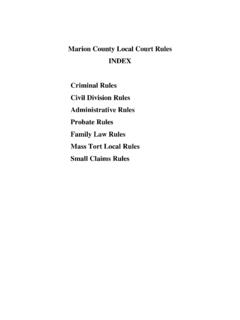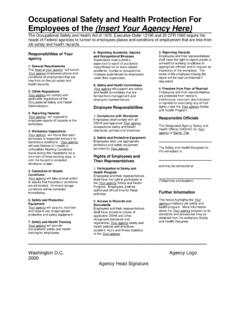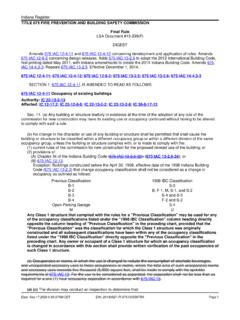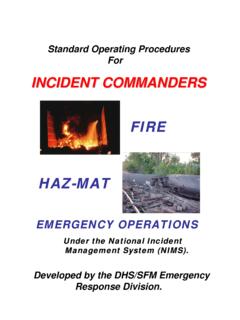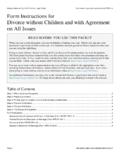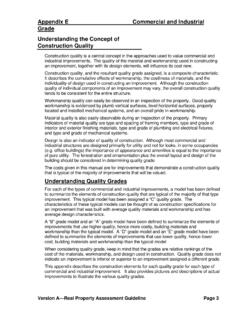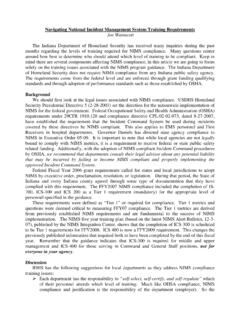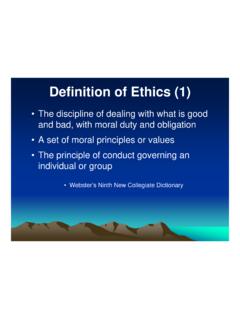Transcription of Police Ethics - Part I - Indiana
1 Police Ethics - part I by Lt. Steven D. Guthrie - ILEA - 4/30/08 The following work was written by Lt. Steven D. Guthrie of the Indiana Law Enforcement Academy for his Master Instructor requirement. It has been edited slightly for length and divided into two parts. part I is presented his month. It lays the foundation for a discussion on Police Ethics . part II will be presented next month. Abstract In our highly technological and multicultural society there has been a high degree of social, economic, political, and cultural change during the past fifty years. It is only natural that some people will accept change; some will resist, and some will be confused, but most will debate the wisdom of doing things differently (Misconduct, Corruption, Abuse of Power-What Can the Chief Do, Edward J. Tully, 1998). Nevertheless, it appears that most would agree what was acceptable behavior in the 1950's has changed tremendously with what is acceptable behavior in today's society.
2 With this in mind, it is no wonder that during the past several years law enforcement behavior has been the subject of increased scrutiny across the country. The forces publicizing Police officers conduct, along with many well-organized interest groups, make the job like working in a virtual "fishbowl". Police officer's actions are certainly more visible and more publicized; to include their mistakes and instances of inappropriate behavior, than they were years ago. However, concerns about Police integrity, corruption and unethical behavior are nothing new. While the power inherent in Police work is seductive and exhilarating, it has the potential to lead some Police officers down a path of ethical compromise in the performance of their duties, which can devastate one's life through loss of their job, career, reputation, friends or family, and can even result in prison time. There are, no doubt, advocates on both ends of the spectrum in the debate regarding whether or not law enforcement is a profession.
3 However, not everyone will accept law enforcement as a profession unless we start doing certain things better. For law enforcement to be fully recognized as a true profession, we must create the proper framework for doing the right thing at the right time. While Police officers have absolute control over their own integrity and professionalism, a portion of responsibility lies with Police administrators. Leaders who demonstrate integrity - in other words, leaders who talk-the-talk and walk-the-walk will enable law enforcement to be on the right road in attaining this goal of being recognized as a profession. Ethics In Law Enforcement The consideration of Ethics and ethical behavior has existed for centuries. Aristotle, Plato, and Socrates are generally considered some of the most influential of ancient Greek philosophers. They transformed Pre-Socratic Greek philosophy into the foundations of Western philosophy , as we know it today. Socrates was one of the first philosophers to delve into the issue of Ethics , especially the ethical treatment of problems in government.
4 Before discussing how Socrates would likely view law enforcement today, it is important to understand the duties and responsibilities of law enforcement. Law enforcement officers do not serve as a direct arm of the state, such as the military. Thus, a law enforcement officer's fundamental duty is to serve and protect the community; to safeguard lives and property; to protect the innocent against deception, the weak against oppression or intimidation and the peaceful against violence or disorder; and to respect the constitutional rights of all men to liberty, equality and justice (The Police Code of Ethics , 1992 IACP version). In England, Sir Robert Peel in 1829 created what is often referred to as the first professional Police force. This Police force obtained its authority from the common-law legal obligation and was viewed as being part of the community. Police authority was to be as unobtrusive as possible, so as not to infringe upon citizens' rights. Consequently, today's justice system tends to lean towards the concept of common-law rights, , the right to property, the right to defend oneself, and the right to protect one's property.
5 Within our current society, it has become more difficult to address questions and concerns relating to Ethics and ethical behavior because the rules and laws change constantly and officers' freedom to perform the tasks at times becomes obstructed. Keeping this in mind, we must also realize that Police work is not a business designed to make a monetary profit. Because policing is a "not for profit" endeavor, the law enforcement officer's number one objective is the people in the community. Therefore, rather than profit being the bottom line for the Police agencies, it is the adherence to the common-law mandate. If this mandate is not met, then law enforcement will fall short of their responsibility. Since law enforcement officers are in the "people business" it is essential that we act in an ethical manner at every level of the Police organization, starting at the top. It is at this level where top management has the obligation to chart the path of the organization in a manner that can achieve the common-law mandate and provide for an ethical Police organization, ensuring that all Police personnel adhere to policies, rules and regulations.
6 What is " Ethics "? " Ethics " is a system or code of conduct based on universal moral duties and obligations that indicate how one should behave. "Values" are core beliefs that guide our choices and actions and determine the purpose of our lives (Josephson Institute of Ethics 1997, Making Ethical Decisions). Most people associate integrity with "core values," which are defined as a set of beliefs, values, and standards. Without a set of "anchors" to measure behavior against, we could say that "Mother Teresa" was no different from "Saddam Hussein" because each, by definition, is a person of integrity (if you define integrity as living in a manner true to the principles you believe in). Obviously, both of them have somewhat different core values. How is integrity defined? Integrity comes from the Latin "integritas" and "integra" meaning whole, or complete. Integrity is based on one's actions on an internally consistent framework of principles to the extent that their actions and beliefs are based on the same core set of values.
7 Although values may change, it is their consistency with each other, that is, a person's day-to-day acts or speech that tends to reflect those principles that will determine their character, good or bad. Therefore, one's words and actions should reflect a relatively stable set of core moral virtues, by which one is committed to live by; as good character is a life-long pursuit ( - Misconduct, Corruption, Abuse of Power - part II, What Can the Chief Do, Edward J. Tully). Consequently, some essential moral qualities that should be considered in the recruitment process of Police applicants are: honesty, truthfulness, accountability, fairness, courage, empathy and self-discipline. The "Six Pillars": Possessing Ethics and establishing ethical standards, basically means doing the right thing at the right time in the right way. Citizens expect law enforcement personnel to have a set of values and norms by which they live. Consequently, without a set of anchors to measure behavior one would have a confusing ethical predicament.
8 In today's society, most people would agree the "Six Pillars of Character" are sound anchors against which one can measure behavior. The "Six Pillars" (Josephson Institute of Ethics 1992, Making Ethical Decisions) are: 1. Trustworthiness - integrity, honesty, promise keeping, loyalty 2. Respect - courtesy, autonomy, diversity, Golden Rule 3. Responsibility - duty, accountability, pursuit of excellence 4. Justice/fairness - openness, consistency, impartiality 5. Caring - kindness, compassion, empathy 6. Civic virtues/citizenship - lawfulness, common good, environment Using the Six Pillars as anchors in one's life gives a person an ethical checklist. Is it legal? Does my decision violate codes, laws or constitutions? Is it balanced? Is my decision fair, both in the short and long term? Is it a win - win situation, and most of all, how will I feel about myself as a result of my actions? So why is it so difficult for a person to be ethical if one just lives by these standards, and why do we have Police misconduct and corruption?
9 What is Police deviance and corruption? " Police deviance" includes all activities that are inconsistent with norms, values or Ethics within the society norms, even from the Police perspective. It is wrongdoing that goes against the organization's policies, procedures, principles and values. It may consist of drinking on duty, sleeping on duty, accepting gratuity, sexual misconduct or lying and misusing confidential information, which is sometimes rationalized as a "Noble Cause", making the world a better place to live, also known as "street justice". " Police corruption" is any proscribed act involving the misuse of the officer's position for personal or monetary gains or another form of "Noble Cause," such as Police brutality (The Corruption of Noble Cause, John P. Crank, & Michael A. Caldero, ). There are certain traits or conditions of responsibility and power that are attached to the position of being a Police officer. With this in mind, Police work by its very nature involves the slippery slope, , "the potential for gradual deterioration of socio-moral inhibitions and a perceived sense of permissibility for deviant conduct" ( Police Deviance & Ethics , Ida Tarbell).
10 It is no wonder Police officers deal with ethical dilemma decisions on a daily basis considering their work environment. What research has discovered? Thousands of men and women every year in this country raise their right hand and are sworn to enforce the laws and to protect and defend the Constitution of the United States, as well as the constitution and laws of the state in which they live ( Police Ideology and the Constitution, Chuck Klein, p3). Most of these new officers are young and enthusiastic and want to make a difference in their community. So what causes some of these new Police officers to behave inappropriately? Several of the more publicized commissions for investigating corruption were the Knapp Commission in the 1960's, the Mollen Commission in 1993 and the Christopher Commission. Additional corruption investigations include the Philadelphia Police Department investigation of 1974, the internal investigation in Miami, Florida in the 1980's where seventy-five Miami Police officers were arrested and the Rampart Investigation in the late 1990's within the Los Angles Police Department.

